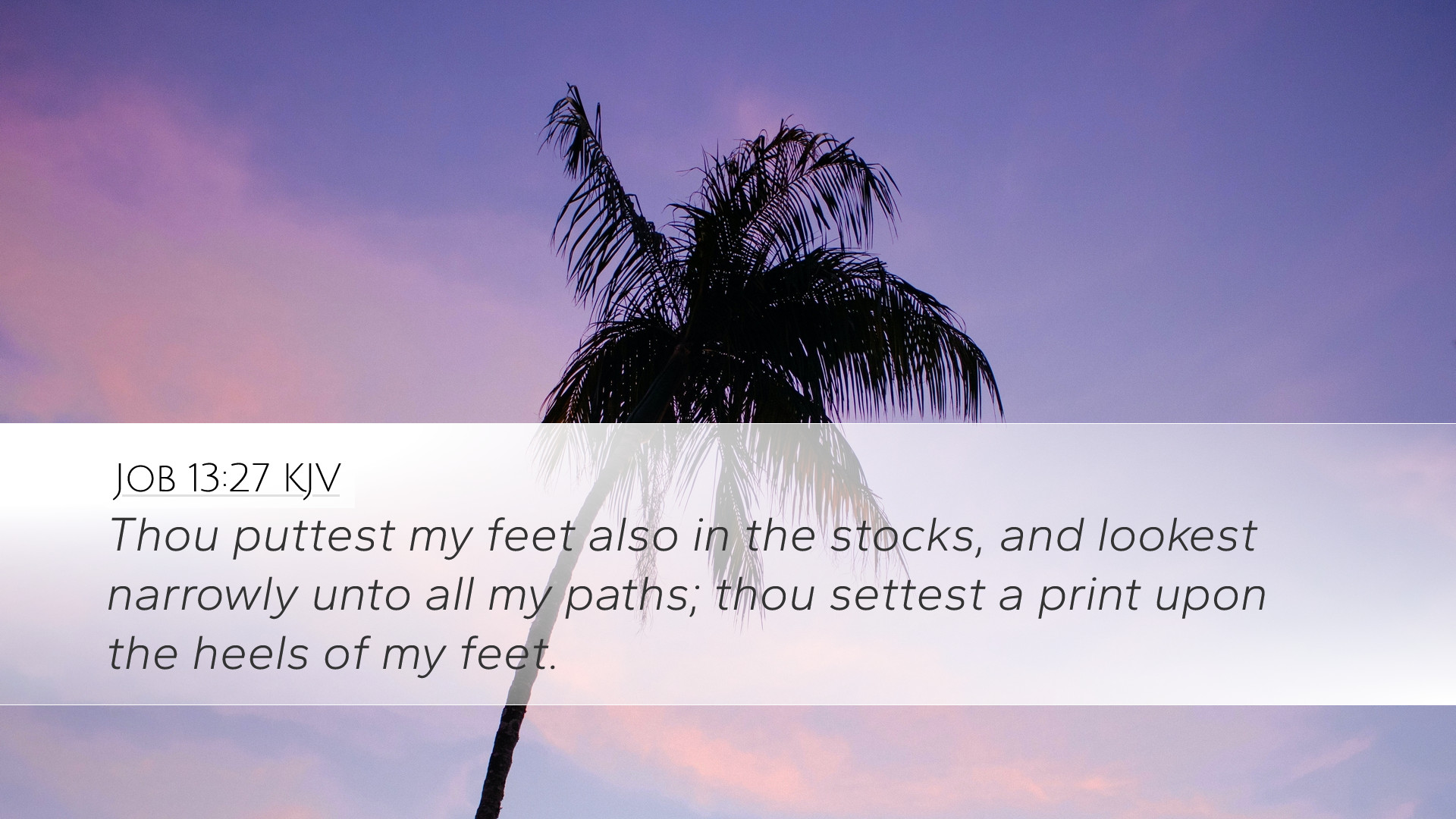Old Testament
Genesis Exodus Leviticus Numbers Deuteronomy Joshua Judges Ruth 1 Samuel 2 Samuel 1 Kings 2 Kings 1 Chronicles 2 Chronicles Ezra Nehemiah Esther Job Psalms Proverbs Ecclesiastes Song of Solomon Isaiah Jeremiah Lamentations Ezekiel Daniel Hosea Joel Amos Obadiah Jonah Micah Nahum Habakkuk Zephaniah Haggai Zechariah MalachiJob 13:27
Job 13:27 KJV
Thou puttest my feet also in the stocks, and lookest narrowly unto all my paths; thou settest a print upon the heels of my feet.
Job 13:27 Bible Commentary
Commentary on Job 13:27
Job 13:27 reads: "Thou puttest my feet in the stocks, and lookest narrowly unto all my paths, and makest all my ways to be in weight." This verse captures Job's sense of confinement and scrutiny in his relationship with God, as he wrestles with his suffering and perceived injustice.
Contextual Overview
The Book of Job raises profound questions regarding suffering, divine justice, and human righteousness. This verse specifically illustrates Job's feelings of being trapped and evaluated, akin to a prisoner under watch.
Interpretative Insights from Commentaries
-
Matthew Henry:
Henry emphasizes the metaphorical language used by Job. In likening his experience to being placed in stocks, he conveys a sense of imprisonment by God’s scrutiny. Job perceives that God is examining each step he takes, which reflects his sense of being judged without understanding the reason. Henry notes that this brings a feeling of helplessness as Job's paths are weighed and measured, hinting at the weight of divine expectation upon the individual.
-
Albert Barnes:
Barnes remarks that the imagery of stocks implies restraint and an inability to move freely. He points out that Job feels as if he is being treated as a criminal, and he questions why God would put him under such intense surveillance. Barnes highlights the theological implications of Job’s perception: that he is being actively watched like a subject of divine inquiry, provoking questions about divine justice and the potential for human integrity. It is a painful realization for Job, who has known himself to be a righteous man.
-
Adam Clarke:
Clarke explores the meaning of "all my paths" and “all my ways to be in weight.” He notes that Job laments how God seems to make everything he does heavy with consequence, leaving no room for error or relief. Clarke suggests that this reflects the duality of human experience—where one seeks to maintain integrity in a world where divine justice isn't apparent. The physical imagery of stocks also signifies not just imprisonment but a search for truth about one's moral standing before God, raising the question of how one measures righteousness in the face of suffering.
Theological Implications
Job's lament reveals essential truths about the nature of suffering and God’s sovereignty. For pastors and theologians, this verse serves as a reminder that members of the faith community may experience times of seemingly unjust suffering, which can cause them to feel under constant examination by God. This highlights the human condition's vulnerability in the face of divine oversight.
Practical Applications
-
For Pastors:
Job 13:27 can be a touchstone for pastoral counsel. It offers an avenue to discuss the feelings of despair that often accompany suffering, reminding congregants that they are not alone in their struggles. Pastoral care may be oriented towards helping individuals understand their circumstances through the lens of hope and divine presence, even amid their suffering.
-
For Students:
Bible scholars and students studying Job should consider how the themes of scrutiny and weightiness of life apply to contemporary life. Exploring the narrative’s theological depth can encourage them to apply critical thinking around suffering, faith, and how one’s life path can appear before God.
-
For Theologians:
The examination of Job's feelings in this verse challenges theologians to address the nuanced understanding of God’s justice and the problem of evil. It invites reflection on how divine oversight relates to human freedom and accountability, and how this impacts theological doctrines concerning providence, grace, and human suffering.
Conclusion
Job 13:27 powerfully expresses the tension between human experience and divine oversight. As Job articulates his feelings of being trapped and closely observed, he embodies a fundamental human struggle with theodicy. This verse serves as a significant point of reflection for all believers dealing with the burdens of life’s challenges, reminding them of God’s awareness of their paths while inviting them to trust in His overarching purpose.


